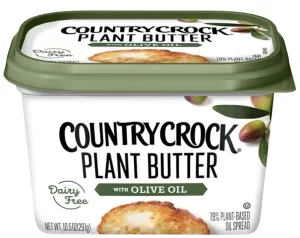Last month I read a really interesting article titled “The Lies in Your Grocery Store” in the New Yorker. If you have time, it’s a great read! TL;DR: it mainly follows the story of one New York-based lawyer determined to hold food companies accountable for the way they market to consumers, and goes over many examples of how these food companies sneakily gain our trust by cajoling us into thinking they care about our health.
The leading example is Country Crock Plant Butter Made with Olive Oil. Based on the picture (below), it does in fact look healthier than regular stick butter. Including the forest green color represents the involvement of plants which we know are good for us, and being plant-based is still very trendy (people who don’t eat mostly plant-based often ask me: “Should I be eating plant-based? And what does plant-based mean?”). Quick note about that – it doesn’t always mean healthier. Lots of processed foods can be made exclusively from plant sources but can be less than healthful. The power of marketing!

Furthermore, the minimalist design suggests minimal ingredients are used. Overall, most of us would think that’s a healthier choice. The less that goes into making something, the healthier it has to be, right? The article goes on to share how it isn’t, and how this lawyer sued the makers of the product for making people think it was healthy when it wasn’t. All due to wording and packaging.
Now, I’m not going to go into details about whether this particular plant butter is healthy. The point of this post is to pose the question: what lies do you fall for in the grocery store?
I want you to think for a second about what draws you to pick something up. Are you attracted to minimalist packaging, suggesting the product is clean and doesn’t have a lot of chemicals? Are you attracted to healthy buzzwords like “all natural” that actually mean absolutely nothing? Do you think the more expensive an item is the better it is for you, like Magic Spoon cereal which is $10 a box?
While it’s not something you might want to hear, it’s important that you know that the grocery store, and food in general, is a business. I’m not saying that there aren’t companies out there that do genuinely care about the healthfulness of their products (and there are some I love!), but the goal is to make money and they’re going to do whatever they can to make sure you are attracted to what they’re selling. This is especially true for companies that make food that’s typically viewed as less healthful. The question they have to answer is: how can we make this appear more healthy so we don’t lose any customers and we gain more?
In order to better navigate this, I teach my clients how to shop. I teach them how to evaluate foods for healthfulness, read food labels, interpret ingredient lists and evaluate health claims we see on packaging to make them more informed shoppers and eaters. I even go to the grocery store with my locals!
If you’re reflecting right now and thinking, “hmmm, I definitely am a marketer’s dream. I am always buying products that look healthy even if I don’t know if they actually are,” then you need me to teach you how to sift through the bullshit!
